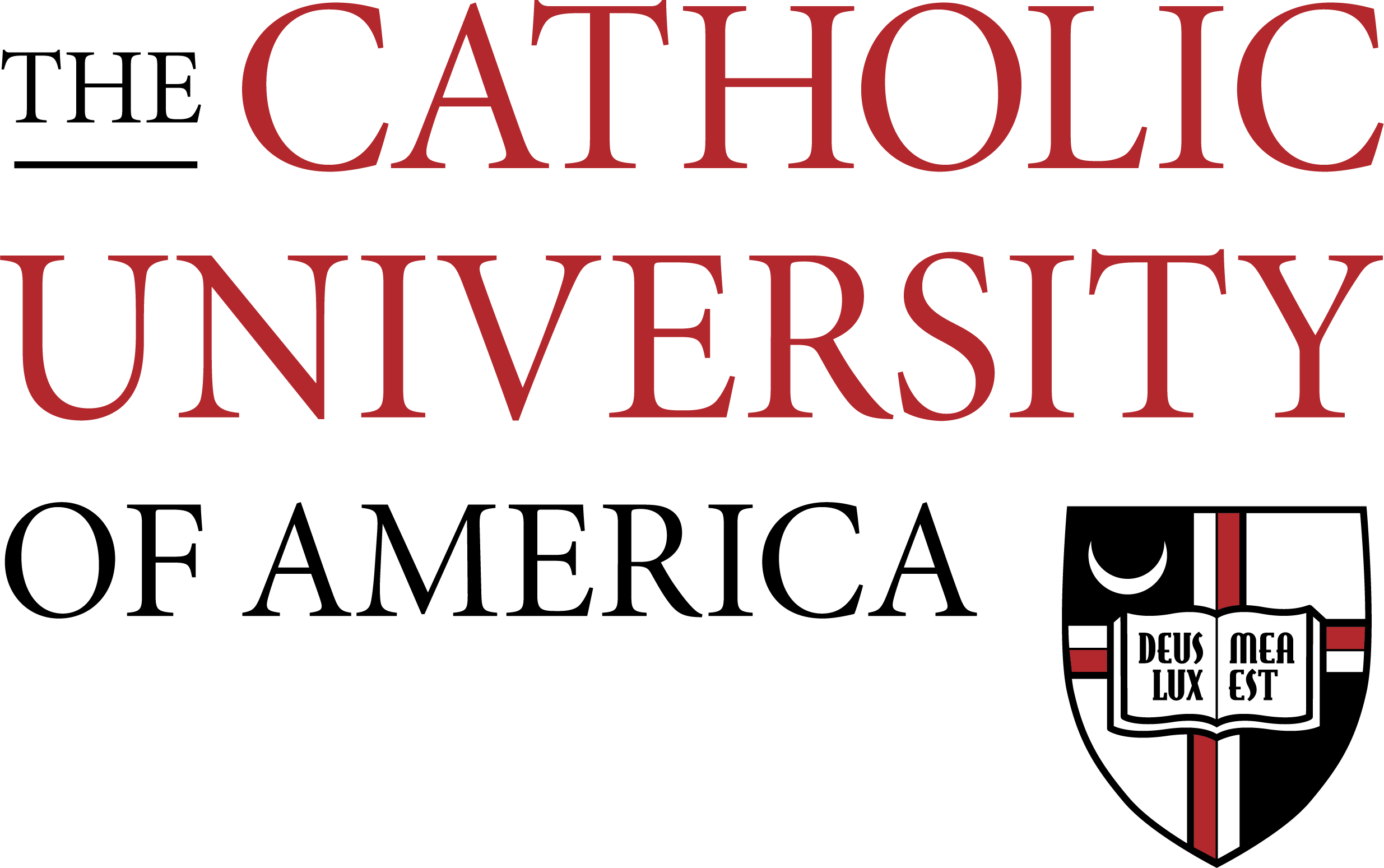Elevating Diversity & Guiding Employment
Past Student Spotlights
January 2023
Shreyaa Venkat | CEO of NEST4US
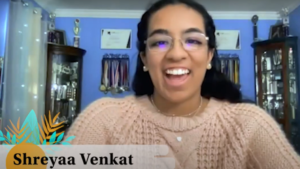
We recently sat down with Georgetown University student and CEO, Shreyaa Venkat, to learn about her nonprofit NEST4US. Read our full interview below or click here to watch video snippets.
TNPA: Hi Shreyaa! Can you tell us a little more about you and your organization?
Shreyaa: Hi, my name is Shreyaa Venkat. I am a 20-year-old junior at Georgetown University, majoring in Global Health and the co-founder and CEO of the nonprofit NEST4US, which was formed as a philanthropic platform built upon kindness, generosity, and social good.
Through our five core programs, we tackle over 14 of the UN Sustainable Development Goals and a plethora of other societal issues, including global hunger, climate change, quality, education, poverty, mental health, equity, and so much more. What once began as a small project six years ago, is now a multifaceted global organization fueled by over 5,000 volunteers who altogether contributed over $2.1 million in value of volunteer hours impacting 10s of thousands in over 30 countries across six continents.
At NEST4US, we not only supply essential resources, such as nutritious meals, blessing bags containing toiletries, and PPE and academic materials, but also societal awareness through interactive workshops and social media engagement to spur words into action. Most importantly, we foster a sense of community fueled by love and compassion by providing an overarching support system for each and every individual we come across. This dual approach of awareness plus action enables us to fulfill our vision of empowering people of all demographics to create a more inclusive world for everyone everywhere.
————————————–
TNPA: That’s great! So what inspired you to join the nonprofit sector and make a difference?
Shreyaa: Service has been an integral part of my life for as long as I can remember. I started giving back from a very young age, guided by my parent’s influence, especially my mom who would bring me along to volunteer at school and community events with her even back in elementary school. That’s when I was first introduced to the world of Community service. I had so much fun giving back in the community, especially with my own family, that I wanted to create opportunities where other families and other friends could volunteer together and explore their passions.
And I think that’s what was key. I was so passionate about volunteering right from the beginning and this passion is what ultimately led me to form NEST4US along with my sister Esha, through which I offer a multitude of volunteer opportunities for people of all ages and backgrounds to be part of the solution. Ultimately, I paved the way for everyday citizens to discover their, what I like to call, service niche and passions within the social activism sphere in an unrestricted manner.
To me, bringing together various groups of people allows for diverse perspectives, sparking more equitable solutions for the greater good, which is part of our mission statement. This ultimately starts with integrating youth into the decision making in the nonprofit sector. So by giving opportunities for youth to take on leadership roles, I equip them with crucial leadership and communication skills which cultivates the next generation of leaders daily.
————————————–
TNPA: Love that! What are some things your organization has done so far?
Shreyaa: Since we started, we’ve helped countless people across the globe initiating community-based action and activism by utilizing social engagement as a superpower for catalyzing social good. As mentioned earlier, we have five interdependent programs driven by our strategy of awareness in combination with action that altogether provide a cohesive framework for implementing sustainable practical solutions globally. So first up, we have Nest Nurturers, which tackles global hunger, poverty and food waste through feeding the hungry initiatives, food rescues and hunger-based service projects.
Next we have Nest Tutors through which we ensure personalized continued quality education for kids and young adults worldwide by supplying academic resources, cultural awareness, scholastic guidance, ESL lessons and emotional support.
Then we have Nest Kares with the goal of instilling kindness as a lifestyle rather than a one-time action within the greater community through engagement and blessing, map projects, creation of kindness notes, and the execution of random acts of kindness.
Following that, we have Nest Buddies through which we give underprivileged kids the opportunity to celebrate their birthdays regardless of socioeconomic status with customized birthdays in a box.
And last, but certainly not least, we have Nest Inspires with the goal of networking, empowering, and transforming communities globally via the facilitation of engaging workshops that foster intergenerational conversations about topics like leadership, mental health, climate change, sustainability, and kindness. As well as professional development sessions that build meaningful changemaker networks.
Additionally, we serve as leaders in manifold capacities representing organizations from the United Nations Clinton Foundation, Points of Light, Rare Beauty, Global Peace, L’Oreal Paris, etc.; connecting communities by devising innovative solutions rooted in intergenerational, intercultural, and intersectional change.
————————————–
TNPA: Sounds like a lot of great work. Can you explain the tasks involved in running your own nonprofit organization?
Shreyaa: Let me just start by saying that running your own nonprofit involves a wide range of comprehensive tasks that when each done efficiently, contribute to the overall effectiveness at every level of the organization. But don’t be overwhelmed by this. It’s simply a bunch of parts involving people with diverse skills and assets working together to make the whole apparatus function to the best of its ability.
So here’s a rough framework of NEST4US’s organizational leadership approach, which adapts to different circumstances as applicable. So one of the main organizational tasks we do through NEST4US is planning all of our different events and initiatives through our five core programs, taking into consideration key clients, various social issues, target populations, the time and resource required, and community volunteer involvement which is huge. Also, another important piece of the puzzle is connecting with organizations around the world to provide assistance to underserved populations, assess the needs of specific communities, coordinate donations from numerous sectors, develop viable action plans, and offer informative yet engaging resources to the global community.
We also utilize various social media mediums as a volunteer recruitment tool. Gen Z uses more technology in digital education than any other generation, so we’re able to use our voices to uplift those who need it most and ignite positive change. In addition, we raise awareness of various societal issues through public engagement, promote existing services and implement the most feasible approaches, involve communities and intergenerational dialogue, and advocacy campaigns, and rally citizens to use their voices to create positive, lasting change.
————————————–
TNPA: What advice would you give anyone thinking about starting their own organization?
Shreyaa: The best advice I would give to anyone looking to start their own nonprofit is to take it step by step. First, start by seeing what you’re passionate about and what causes you resonate most with. Once you figure that out, go around your community and try your hand at volunteering for different organizations in your community. Then the next big step is to advocate and get the word out, which I would definitely recommend leveraging social media and technology for because those are going to be huge assets for you.
At the end of the day, don’t be afraid to take risks, learn new things and reach out to other people to collaborate for the greater good. Besides, the worst thing that could happen and that you can get in response, is no. So remember when one door closes, three more will open up, so don’t give up on whatever goals or dreams that you have just because of one or two setbacks.
Don’t forget that solving these issues will take time and effort. At times it may seem like what you’re doing doesn’t actually make a difference, but the truth is it really does. Every little thing added up contributes a lot to the bigger picture. So always remember that what you do does matter, and even just thinking about these first steps is a step in the right direction.
And lastly, if not most importantly, don’t ever believe that you’re too young or too old, or that it’s too early or too late to change the world because everyone has the power to make a difference. Just thinking about wanting to make a difference and trying out something new that aligns with your passions and ambition is a huge step in the right direction.
————————————–
TNPA: Such great advice! So, in general, why should others get involved in the nonprofit sector?
Shreyaa: I think others should join the nonprofit sector to make a difference because of the extensive array of opportunities, connections and resources accessible to you in this space. There’s no one perfect path in the nonprofit world, which is even more advantageous for students because it gives you autonomy in choosing the area or path that connects with what you feel most passionate about and feel that you can make a true, meaningful difference with. In the nonprofit sector, you’re also given many opportunities to develop critical career readiness skills, ranging from leadership and cooperation to self-reliance and empathy that can be used in almost every aspect of your life. Also helps you enhance your time management and organizational skills which can go a long way in increasing productivity and success within your careers.
One of my favorite parts about working in the nonprofit sector is also the feeling that I get when I contribute meaningfully to society, as it’s so fulfilling and honestly unparalleled. One of the best parts of hands-on volunteering is definitely the connections that we’ve made, both with our volunteers and those we’ve served. When we help others directly, we can see the impact first-hand that we make on the people that we’re helping, and it’s a completely different feeling.
I believe that the best way to get involved with your communities is to help out wherever you can, whether that be donating your money, your time, your knowledge, even if it’s just a little bit, that can make a huge difference in your community. There’s a way for anyone in the world, regardless of age or background, to get involved in community and join our volunteer family team NEST4US, if you’re looking for a head start. Best of luck to all of you!
TNPA: Thank you Shreyaa and best of luck to you as well!
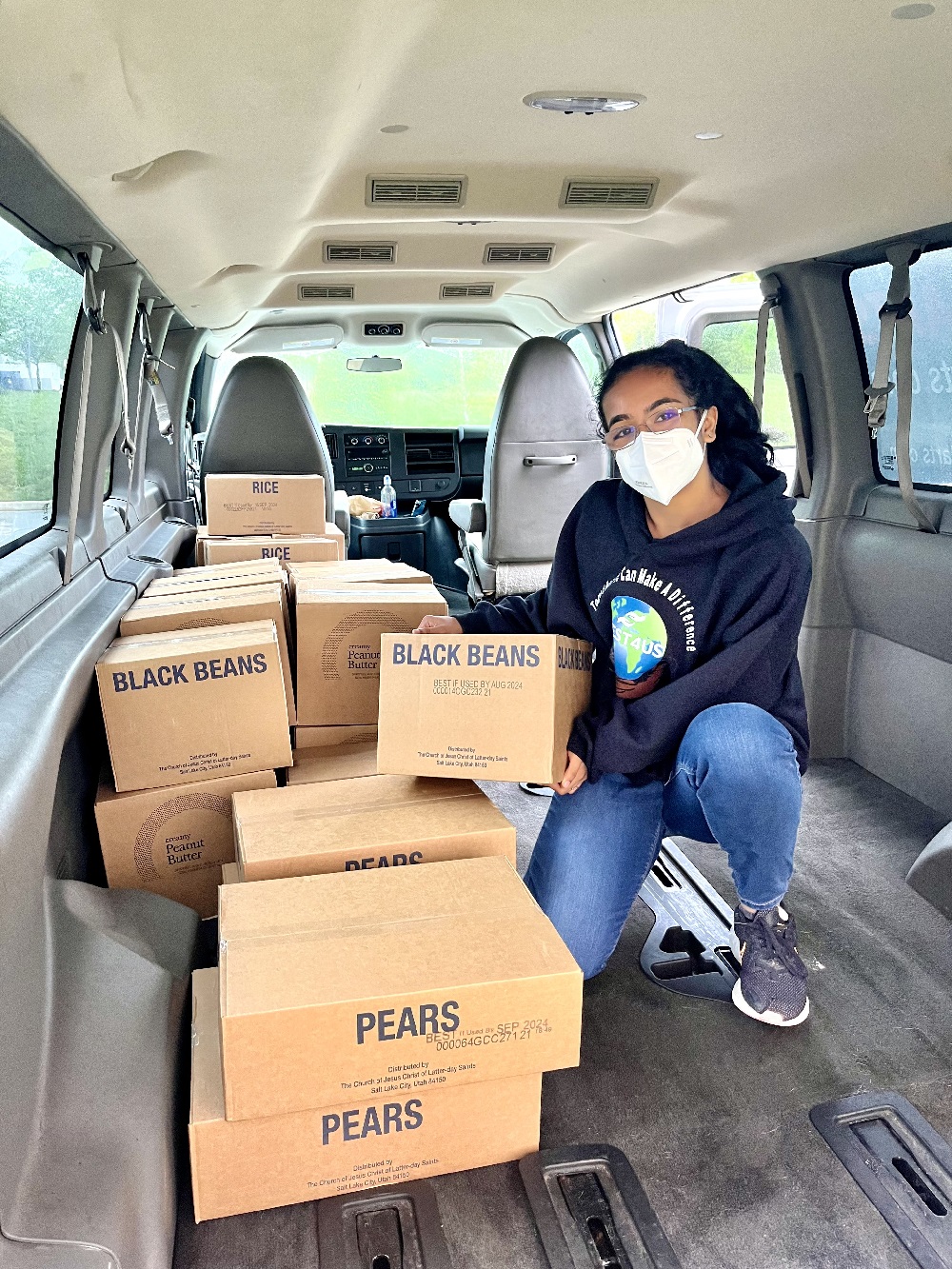
“Zero Hunger” Food Distribution Event
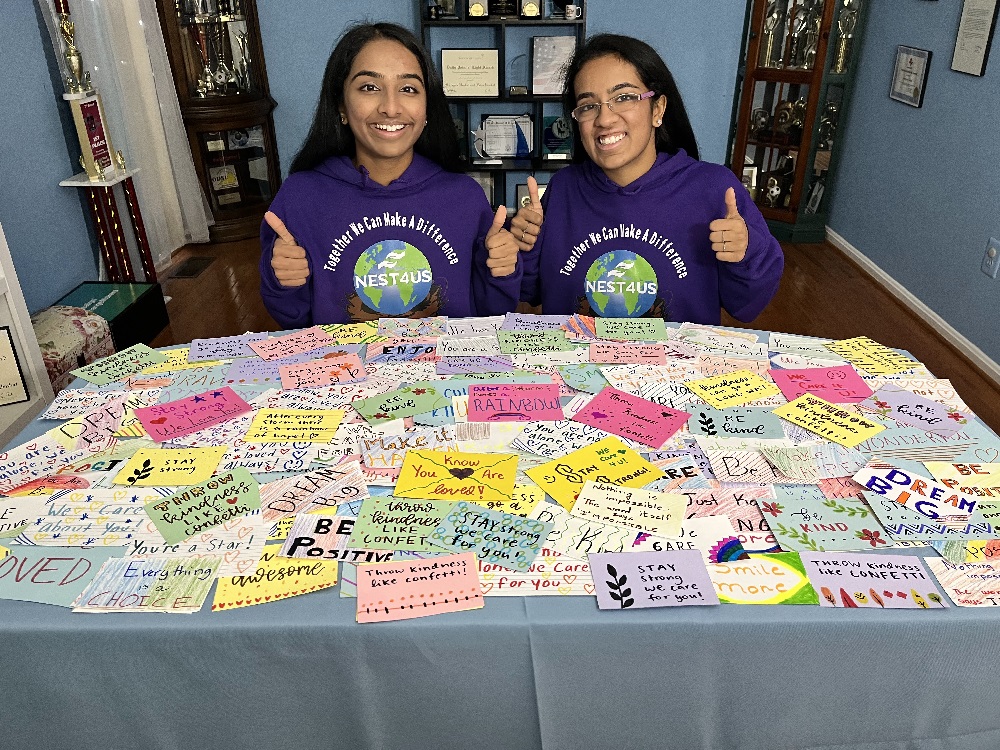
Co-founders Esha Venkat (left) and Shreyaa Venkat (right) sitting in front of “Nest Kares” Kindness Notes
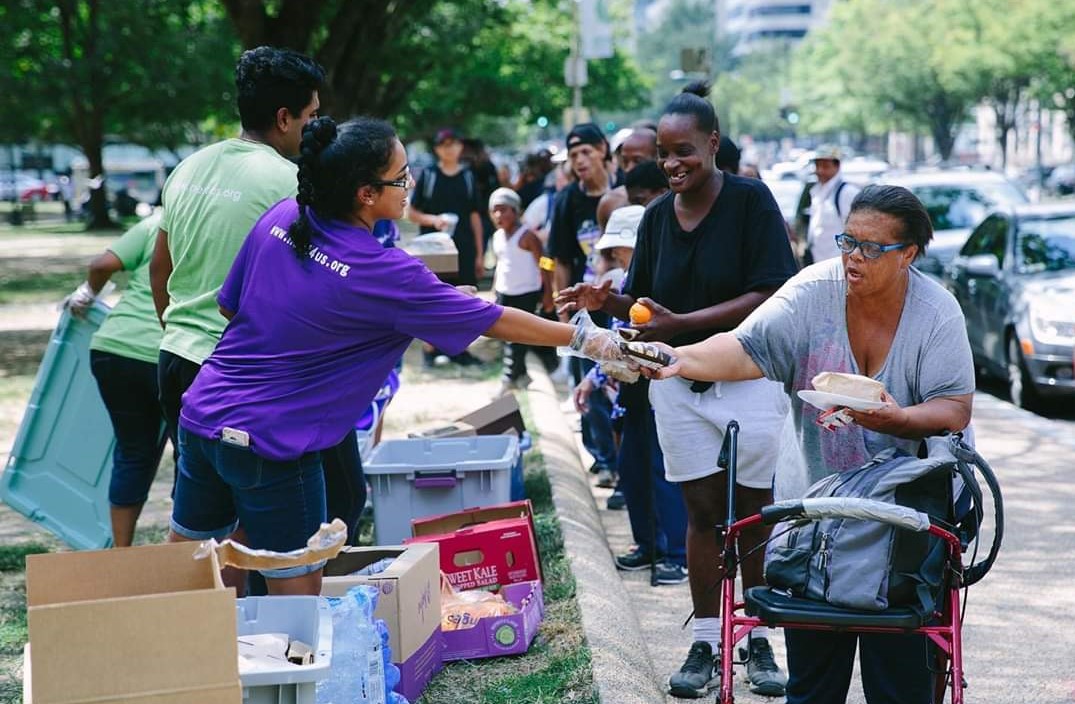
NEST4US serving the homeless community during National Hunger and Homelessness Awareness Week.
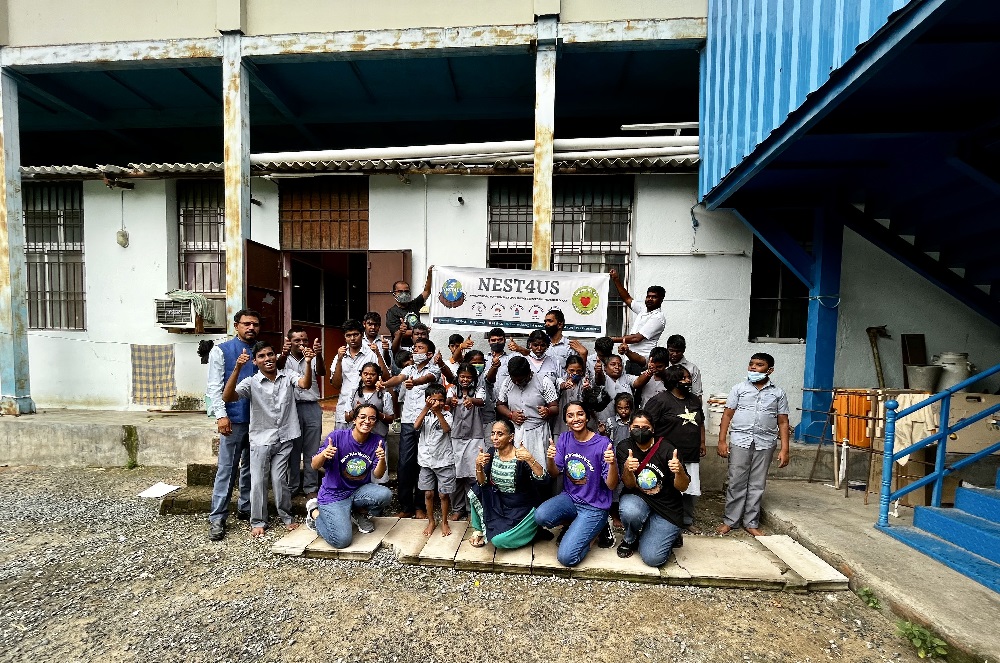
NEST4US serving kids with special needs at Karunai Trust in India.
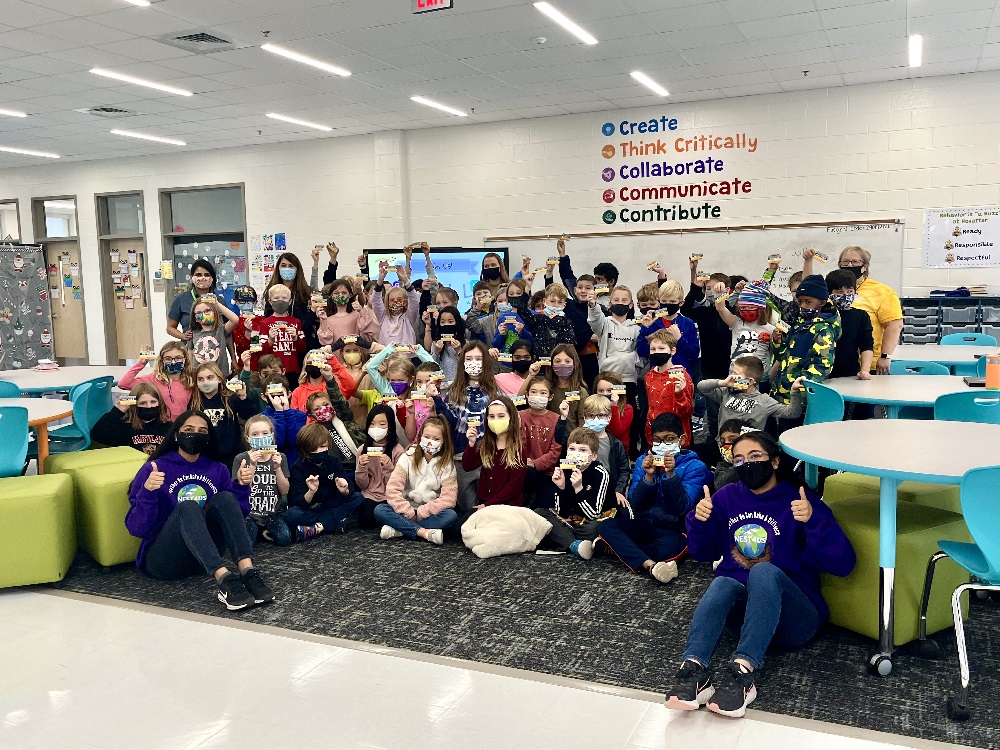
NEST4US giving a “Power of Kindness” presentation.
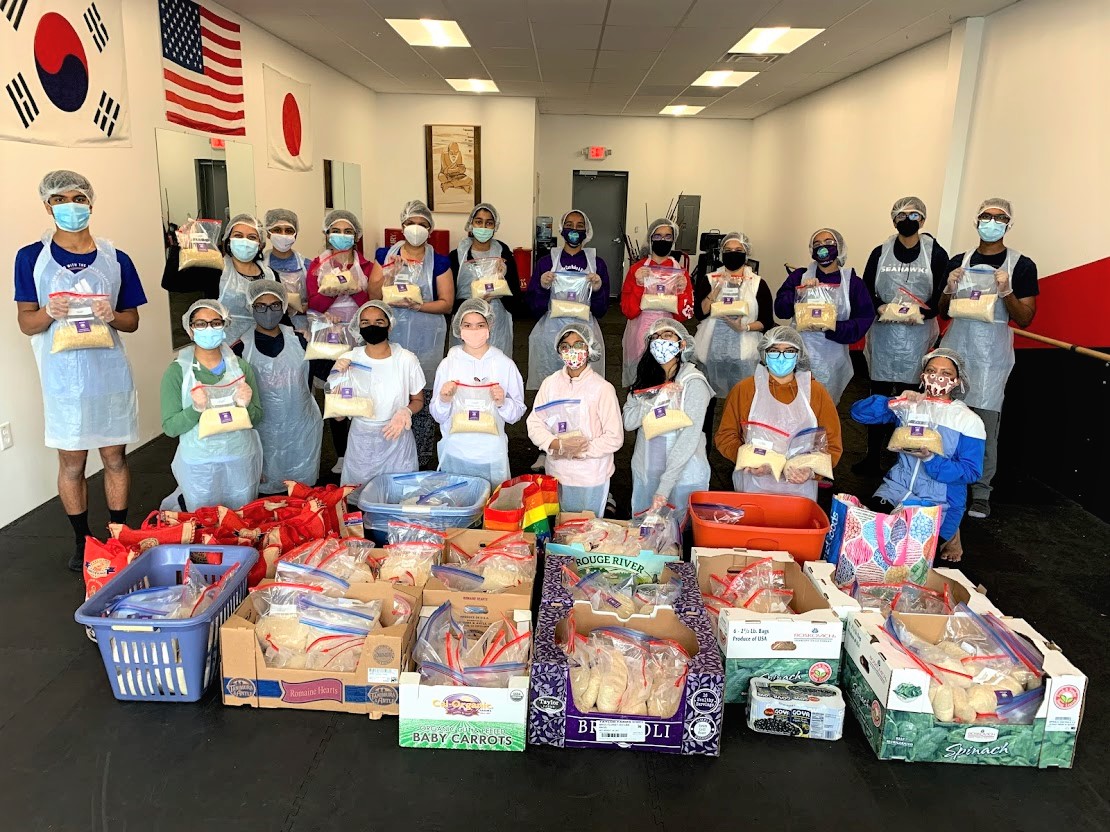
NEST4US at the “GYSD Rice Up Against Hunger” event.
Follow NEST4US!
Website: www.nest4us.org
LinkTree: https://linktr.ee/nest4us
April 2023
Huey Bodger | Senior at The Catholic University of America (CUA)
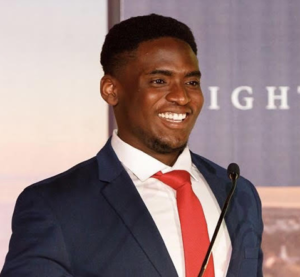
Hear from Catholic University of America (CUA) student and Leading EDGE alum, Huey Bodger, about his experience as a participant and keynote speaker at CUA’s annual MLK Day of Service event.
This past January, I had the incredible opportunity to participate in the MLK Day of Service, an annual event hosted by Catholic University to honor Dr. Martin Luther King Jr.’s legacy of service. As the keynote student speaker, I shared with my peers what MLK’s legacy meant to me and emphasized the importance of doing a job well done. I was inspired by King’s words, “If a man is called to be a street sweeper, he should sweep streets even as a Michaelangelo painted, or Beethoven composed music or Shakespeare wrote poetry.”
After the speech, I joined the Black Student Alliance, other student organizations, and university leaders to serve our community at the Washington Hebrew Congregation. Together, we worked on various projects such as creating no-sew blankets, making spinach lasagna casseroles, assembling toiletry bags and feminine hygiene products, preparing trail mix, and making turkey sandwiches for those in need. It was a humbling experience to see so many individuals come together and serve those around us.
The event was organized by Emmjolee Mendoza-Waters and her team, who found various opportunities for us to serve in the DC area. It was an honor to be a part of this event and contribute to making a positive impact in our community.
My favorite part of the day was seeing people from CUA nearly seamlessly work alongside other DC residents, specifically when we were preparing lasagnas to be sent out to people in need. Making lasagna is easy in your kitchen, but creating 200+ takes a lot of teamwork.
To me, service means caring about a fellow person, recognizing their human dignity, and following up on this knowledge with action. Everyone needs help at some point in their lives, and everyone should fill those gaps for each other. Service means putting yourself second when the culture we live in would pull you only to serve yourself.
Other people should get involved in their communities because everyone can’t be great at everything. There might be a phenomenal artist who knows nothing about cars or a diligent electrician who knows very little about food preparation. But, if everyone is always offering up their talents and time to those who would benefit, we can create harmony in our communities where people will realize that even though their talents are not identical, they are not very different.
An important part of my speech to me was emphasizing a job well done. King said, “if a man is called to be a street sweeper, he should sweep streets; even as Michelangelo painted or Beethoven composed music or Shakespeare wrote poetry, he should sweep streets so well that all the hosts of heaven and earth will pause to say here lived a great St. sweeper who did his job well.” When people align their talents with diligence, everyone benefits.
July 2023
Sam Li | Senior at Georgetown University
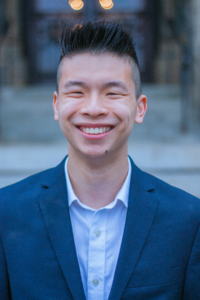
We recently sat down with Sam Li, a rising senior at Georgetown University, to hear more about his nonprofit work and campus leadership roles with BridgeUSA, the Chinese Student Alliance, and Product Space. Read our full interview below or click here to watch the video version.
TNPA: Hi Sam! Can you tell us about yourself – what you’re studying and the causes you’re involved in?
Sam: Sure, I am a rising senior at Georgetown University studying Business and Global Affairs, a joint degree program between the School of Foreign Service and McDonough School of Business. I am passionate about data ethics, specifically user privacy and misinformation. I have translated that passion into various opportunities during my time at Georgetown and in Washington, D.C., including taking classes on the topic as well as conducting research at our McCourt School of Public Policy and the U.S. Library of Congress.
In terms of campus involvement, I founded and served as president for the Georgetown chapter of BridgeUSA, an organization dedicated to combating polarization, led the Georgetown Chinese Student Alliance as president, was selected as project manager and internal project manager for Innovo Consulting, a social impact consulting club, and am now co-founding the Georgetown chapter of Product Space, an organization for product management.
————————————–
TNPA: Great! So what is BridgeUSA and why was it important for you to start the chapter on your campus?
Sam: BridgeUSA is a space aiming to empower students by having them productively engage in controversial discussions. It is safe to say that Americans have a fair share of disagreements, whether it be politics, economics, social issues, and more. The participants of BridgeUSA want to create spaces where people can disagree productively, rather than in a toxic manner, both online and in person.
Last February, I began to recruit members to start the Georgetown chapter of BridgeUSA. As president, I hired a VP, treasurer, secretary, director of events, director of marketing, director of external outreach, and director of creative design. Later on, we added a freshman representative as well as a director of the community. It was important for me to start a chapter on my campus because I believe polarization is prevalent on the majority of college campuses today and it is important to protect constructive dialogue, no matter what the issue.
————————————–
TNPA: Many may not realize the similarities between campus groups and nonprofit organizations in terms of volunteer management, board structure, member recruitment, fundraising, etc. or the opportunities that are available to turn your volunteer experiences into a career. What have you learned from your time starting and leading campus groups?
Sam: I have learned that starting and leading campus groups can feel a lot like running a small organization. There are many important considerations, such as financing for events, conducting proper outreach, carefully recording the logistics of the group, and growing at an appropriate pace. In the beginning, I encouraged our club to aggressively promote ourselves in any space possible. Whether that be through our own social media channels, collaborating with other clubs via events or other promotions, or any other way.
Eventually, I could see the returns in the form of clubs inviting us to collaborate with them, external organizations trying to partner with us, and other benefits. Ultimately, I have learned that it is important to manage expectations starting out while also continuously pitching your organization over and over again wherever you can.
————————————–
TNPA: So true! I saw you also interned with the Climate Reality Project. What was that like?
Sam: Interning at the Climate Reality Project was a great experience. Founded by former VP Al Gore, this organization helps train current and future climate activists/leaders so they can better tackle the pressing environmental problems the world faces. As an Advancement Intern, I was in charge of helping conduct grant research and find prospective donors. I wanted to work with this type of organization because I am interested in sustainability and how important stakeholders are actively working towards creating a healthier and safer future.
During my time at the internship, I was able to learn how to use Salesforce and iWave, comb through massive data sets, and create donor profiles. Additionally, I worked with a great team who taught me more about the sector and how to navigate advancement. Overall, it was a great experience that helped me build valuable skills and knowledge about climate change.
————————————–
TNPA: I like that you were able to find ways to serve your community through both work and campus involvement. What is one of your favorite moments from those opportunities?
Sam: One of my favorite moments serving the Georgetown community was leading the Chinese Student Alliance’s annual Lunar New Year Ball. It is a great moment where Chinese students and friends come together to celebrate one of the most important holidays for Asian and Asian American households. As president, I led my team to plan our biggest celebration yet. We ended up having 120+ community members come for a night of great dinner food, performances, and crafts activities.
I am so proud of the Chinese Student Alliance for all of their efforts. Being able to help make this event a reality is one of the highlights of my Georgetown career. I look forward to this upcoming Lunar New Year Ball, which I’m sure will be even bigger and better.
————————————–
TNPA: Love that! Before you go, do you have any advice for other students about getting more involved in nonprofit work?
Sam: I would just say that once you find a cause that you are passionate about, find any opportunity you can to be involved. For college students, I believe that no position is too small or big and that it’s important to get experience in the field you are interested in.
October 2023
Takiyah Imani Roberts
Founder/Co-Executive Director of Dare to Dream
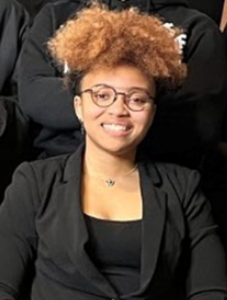
We recently sat down with University of Maryland student and Founder/Co-Executive Director, Takiyah Imani Roberts, to learn about her nonprofit, Dare to Dream, and get her take on the benefits of mentorship while in college. Read our full interview below or click here to watch the video version.
TNPA: Hi Takiyah! Can you first tell us about yourself and what you’re involved in?
Takiyah: Sure, I am a Junior at the University of Maryland College Park, majoring in Equitable Entrepreneurship and Technological Design, a major I created. This primarily concentrates on minority studies, entrepreneurship, and STEAM (Science, Technology, Engineering, Art, and Math). I am passionate about entrepreneurship and increasing the representation of people of color in fields where they are not traditionally represented. Because of that, I find myself working in many positions for equity. I serve on the executive board at Startup Shell — a student-run incubator for startups– as the Director of Diversity, Equity, and Inclusion. I also serve as the Equity Coordinator at Diamond Back — The newspaper company for the University of Maryland, where I work to make the newsroom more equitable.
I also work at the Dingamn Center for Entrepreneurship as a student intern, a top 10 ranking entrepreneurship center. Outside of school, I work as a strategic consultant for various companies. I manage artists and work at an award-winning Grammy studio.
————————————–
TNPA: Love that! Can you tell us more about your nonprofit, Dare to Dream?
Takiyah: Dare to Dream (DTD) started in November of 2022 after I realized a gap in community and resources for minority entrepreneurs who attend predominantly white institutions (PWIs). In addition, our focus has extended to building community at minority-serving institutions, and our team has grown to more than 25 University of Maryland students in less than a year.
Dare to Dream serves dreamers, ages 14 – 28, who represent historically marginalized communities and requires that anyone who goes through their programming is dedicated to giving back to the community to rebuild transformative dreamer communities. DTD has defined a “dreamer” as someone who wants to create their own business, path, or venture or someone who wants to contribute to current systems and processes that we know today. Giving back is defined as pouring back into the youth who represent marginalized communities. This can include volunteering at other schools or events, donating to young Dreamers or Dare to Dream Inc., mentoring youth, etc.
————————————–
TNPA: Sounds like a great cause. What are some things your organization has done so far?
Takiyah: So far, we have secured partnerships with civil rights activists and global entities and designed ESTEAM (entrepreneurship, science, technology, engineering, art, and math) educational programs and curricula. We are closing some contracts to deliver programming focused on helping youth develop their dreams by thoroughly understanding their unique identity. We have also created an event series called Small Artist Big Talent (SABT), in which we provide DMV artists with a platform to perform along with video footage and a community. At the beginning of the SABT events, we have a vending session that allows business owners to sell their products, and we have seen over 100 people in attendance at these events. We are now looking for more opportunities to educate youth, expand our programs, secure funding, and more strategic partnerships.
————————————–
TNPA: So, what is it like to run your own nonprofit organization?
Takiyah: Running a nonprofit as a college student is a very unique experience. The nonprofit sector is not like any other business sector. The industry has many nuances that make it complex and hard to understand. However, as a college student, I have unlimited access to knowledge. Some professors want to share information with you, like classes you can take, events you can attend, and mentors you can acquire simply because you are a curious and ambitious student. I have also grown my team at my university, which most people have difficulty doing.
The University of Maryland has made running my nonprofit a beautiful journey for which I am forever grateful. Despite the more challenging times, I have had a fantastic time running my nonprofit. I have also found some of my lifelong friends working on what I am passionate about. It certainly takes work, but having a fantastic team, board, and mentors along the journey while positively impacting the world has been incredible, and I wouldn’t trade it for the world. I genuinely have the best team that anyone could ask for, a team that has become my chosen family and that makes every hard day that I may have as Co-Executive Director worth it.
————————————–
TNPA: What advice would you give anyone thinking about starting their organization?
Takiyah: The advice that I would give someone starting their organization is to begin. Sometimes, we think too hard about some things, especially when starting a business. Starting is the first step; if you are passionate about your work, you will figure everything out as you go. Prepare and develop a game plan to start your organization, but do not spend so much time planning what you are not doing. Do not let the legal process of forming a nonprofit scare you. There are so many resources online that you can access for free to help you. And of course, anyone interested in starting their organization can contact me, and I would be happy to help.
————————————–
TNPA: Such great advice! With all that you’re involved in, I’m wondering if you have mentors, and if so, what is the value of having mentors while in college?
Takiyah: Without my mentors, I could not do half of what I do. College is the time to network and learn as much as you can. The best way is to learn experientially and have people that can help guide you. Mentors can also help open doors for you and help you find internships, business opportunities, and more. Also, understand that your mentors may change; what you may need help with one semester may be different for the next semester, and that is OK! It is more than OK to have mentors for different seasons, but always pay your respect to anyone who has helped you.
Lastly, always have a mutual relationship with your mentors, and be willing to give them a helping hand when you can. We should always strive to be people of service and ensure we serve those in our lives, especially those who pour into us. I want to give a huge shout-out to all my mentors throughout my collegiate career. Thank you for everything and for shaping me into my person. Yes, Mom, I am talking about you, too!
————————————–
TNPA: Before you go, why should others get involved in the nonprofit sector, too?
Takiyah: I encourage everyone to get involved in the nonprofit sector, ESPECIALLY youth! The sector must have young people working to harness technology and innovation for impact. The nonprofit sector is very multifaceted and is one of the biggest industries. The sector is very complex and a lot of fun to work in. It allows you to do what you love and get paid for it while improving the world. I encourage everyone to work at a nonprofit to get the experience and understand their thoughts.
There is also a massive stigma around nonprofits, usually that they do not make money, which is invalid. Take a look at the Executive Director salaries of nonprofits you know of, and you will see that people in the sector make money. Read up on the sectors and truly understand how they work, and you may fall in love with the sector as I have.
Contact Takiyah
Email: takiyah.roberts@idaretodream.org
Email: kiytheceo@gmail.com
Phone: (301) 337-0804
IG: @Takiyah Imani
LinkedIn: Takiyah Imani
Website: idaretodream.org
IG: @daretodream.inc
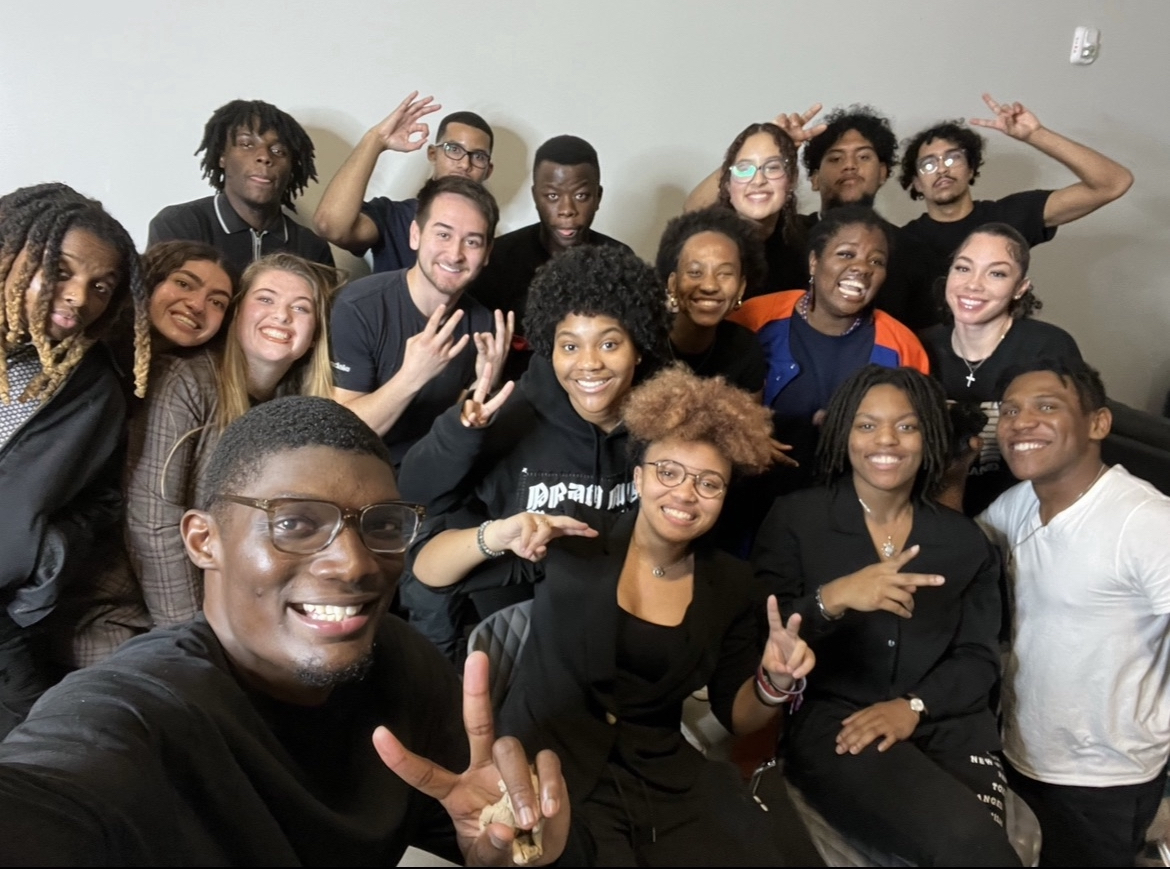


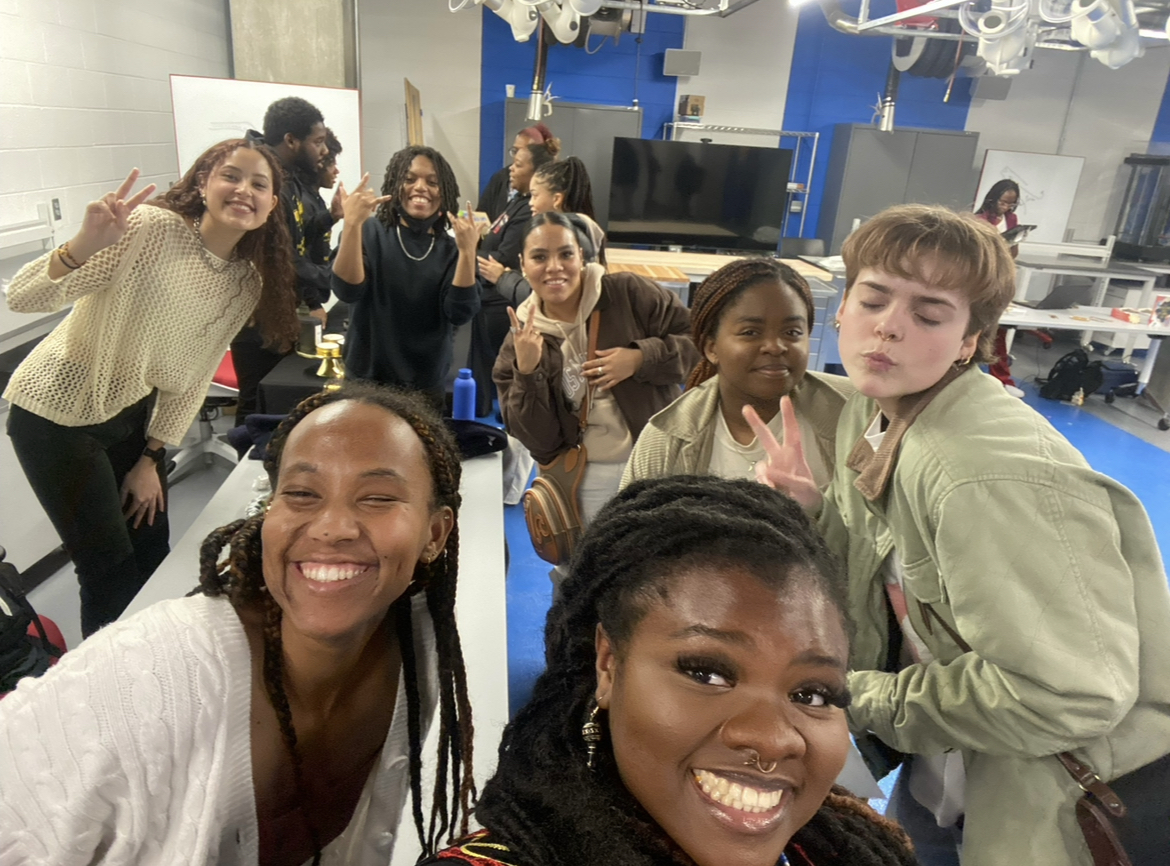
February 2024
Timothy Azucena
Leading EDGE Alum & Recent Grad
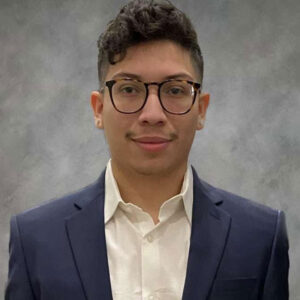
We checked in with University of Maryland graduate and Leading EDGE alum, Timothy Azucena, on his career journey from intern to full-time hire at Moore.
TNPA: Hi Timothy! Can you first tell us about yourself and what sparked your interest in the nonprofit sector?
Timothy: I am a recent grad from the University of Maryland, Robert H. Smith Business School. During my last two years of undergrad, I was primarily involved in two clubs, BMA (Business Management Association) and AMA (American Marketing Association). Both clubs sparked a passion in me but I had a turning point when I interviewed a family friend about their nonprofit, “The Desk Project” where they supply school-age children with desk and learning materials in Malawi. While learning more about this project, a new interest sparked in me and I wanted to learn more about ways I can give back and help make a difference in the lives of people.
————————————–
TNPA: Nice! As many may know, you then found an internship through our Leading EDGE program last summer. Why did you decide to find an internship at that time?
Timothy: I was motivated to find an internship instead of working full-time because I wanted hands-on experience in marketing. I knew that an internship would be more beneficial for several reasons. It would provide me with the opportunity to gain real-life work exposure, opportunities for career growth, and provide personal growth. To me, this outweighed the need for a full-time job right out of college. At that time, I knew it was important for me to prioritize hands-on learning and confirm marketing was a career I would pursue.
My sister, Lia, was another big influence on me and continued to push me to try internships. She knew how beneficial an internship opportunity was and planted a seed in my mind for me to focus on. Eventually, I knew I wanted to do something that benefited others and this internship, to me, was a great opportunity to see how marketing can improve nonprofit causes.
————————————–
TNPA: Great advice from your sister and a true testament to the benefits of hands-on learning! Walk us through your internship at Moore. What was it like?
Timothy: I could not have asked for a better internship! I learned so much from my coworkers and bosses at Moore. I worked closely with the programmatic buying team and it was a very unique experience that I enjoyed immensely. My day-to-day varied but was heavily focused on data analytics, including optimizations, recommendations, and getting hands-on experience in real marketing platforms. I experienced volunteering at a local food bank through Moore. To me, it demonstrated a lot about the company culture and their willingness to give back to the local community.
————————————–
TNPA: Congrats on being hired by Moore full-time! How excited were you to receive that offer and what made you want to continue there?
Timothy: I was ecstatic when I received notice to come on board full-time! Not only did I accomplish completing the internship, but I also was a part of helping make a difference for several nonprofit clients. Seeing the change I could create using marketing was a big goal of mine and being able to continue on that path is something I wanted to do. Every day is a learning moment for me, whether we’re discussing marketing as a whole or the granular details.
As a result of my internship, I have been able to grow and continue to develop my skills and knowledge. Working with nonprofits has been very enjoyable and has definitely kept me on my toes which I really appreciate. I’m challenged in ways that help me remain creative and leverage the skills I am building. The company as a whole is amazing, especially the team I was working with. Shout out to Jaren, Preston, Maddie, Brett, Hannah, Chris, Devon, and Paul! They all have been amazing teachers to me! They have taught me so much, taken me in, and were willing to help me learn and grow, and that’s something that is invaluable to me.
————————————–
TNPA: Wow, that’s great to hear Timothy. So what are some lessons you learned during your journey from intern to full-time? What would you tell others who wish to do the same?
Timothy: I learned many nuggets on my journey but ultimately the main two lessons that I would tell other students would be to 1. always be proactive and 2. always be willing to learn. As a recent grad, if your ultimate goal is to be hired full-time, then you need to demonstrate to your employers your ambition, and drive, and take actionable steps to put yourself in positions to gain more knowledge and level up your understanding of a topic.
Growth can be uncomfortable but can lead to incredible transformation. Take advantage of all the opportunities an internship offers. Just because it’s an internship doesn’t mean it’s any less serious. Network, put yourself in uncomfortable positions to learn, and never be afraid to ask for help. Internships can lead to other parts of career development that you might have not considered which can help create new paths ahead.
————————————–
TNPA: Such great advice! Before you go, is there anything else you want to share on why a student should consider an internship as part of their career journey?
Timothy: An internship is a crucial step forward because it can be used as a stepping stone into your chosen career path. You receive first-hand exposure to real-world experience, networking, furthering your technical skills, and exploring different career paths. I believe internships are awesome because of how beneficial they are when you leverage them correctly. Additionally, internships are a crucial first step toward accomplishing long-term career goals because they usually lead to full-time employment. In the event it doesn’t lead to full-time roles (because of budgeting or otherwise) having a network of professionals that can vouch for your skills is always a leg up when starting entry-level roles.
August 2024
Leah Woldemariam
Leading EDGE Alum & Recent Grad
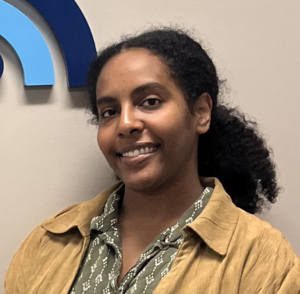
We checked in with George Mason University graduate and Leading EDGE alum, Leah Woldemariam, on her career journey from intern to full-time hire at Further.
TNPA: Hi Leah! Can you first tell us about yourself and what sparked your interest in the nonprofit sector?
Leah: I attended George Mason University and graduated in December of 2023 with a major in Psychology. Having a concentration in Industrial-Organizational Psychology, I initially thought I would go down the Human Resources track. I then became involved in my school’s Black Student Alliance organization, where I served as assistant treasurer. My time there sparked an interest in service and advocacy-oriented work, and my goals shifted. I later interned with a nonprofit called Reclaim Eritrea – an online news platform and advocacy group aiming to educate the public about civic issues and help people become advocates for social progress.
————————————–
TNPA: Love that! As many may know, you then found an internship through our Leading EDGE program last summer. Why did you decide to find an internship at that time and how did you prepare for it?
Leah: As last summer was the last before my college career ended, I wanted to find an internship to clarify what I wanted to pursue after school and gain further experience. I knew I wanted to work in the nonprofit sector in some capacity, but I wasn’t sure where to start. My friend, a member of last year’s TNPA Leading EDGE cohort, informed me of the upcoming opportunity and encouraged me to apply. A tool I utilized to assist me in the process was attending one of my school’s resume clinics. They provided me with resources on resume templates and cover letter writing that were helpful overall when writing my application.
————————————–
TNPA: Such a great example of what it looks like to tap into your network and resources! So walk us through your internship at Further. What was it like?
Leah: My time at Further began with my team showing me the ropes of the digital marketing field and the nonprofit sector. Some clients I worked with included animal welfare and family healthcare organizations. My tasks included writing weekly reports on advertisement performance and optimizing advertisement platforms for better results. I was also able to use my research skills to research industry and social media trends, which helped inform strategy. Aside from work, I also joined the team on monthly happy hour outings, which were always a fun time!
————————————–
TNPA: Congrats on being hired by Further full-time! How excited were you to receive that offer and what made you want to continue there?
Leah: I was thrilled to receive my offer from Further to continue as a full-time employee! My time as an intern was incredibly informative and impactful in building my skill set. I knew that if I joined the team, I would only be surrounded by people willing to help me learn and grow. I also strongly aligned with Further’s values on collaboration and innovation and wanted to continue to work in such a culture. Ultimately, I loved working with nonprofits, and the opportunity to continue that work and help make a difference was impossible to pass up.
————————————–
TNPA: We all were so excited for you as well. So what are some lessons you learned during your journey from intern to full-time? What would you tell others who wish to do the same?
Leah: One of the key takeaways I learned during my journey was to be as interested and receptive to new information as possible. My internship was an essential building block in my career journey and instrumental in teaching me relevant skills. I would tell others who want to do the same to be bold and take initiative. Sometimes, opportunities do not always present themselves; you must create them yourself. Doing so and prioritizing your learning during your internship can only help you as you enter the workforce.
————————————–
TNPA: Such great advice! Before you go, is there anything else you want to share on why a student should consider an internship as part of their career journey?
Leah: Because internships give students crucial real-world experience that a classroom can’t always provide, they should be viewed as an integral part of their career journey. Through internships, students can apply their academic knowledge in real-world settings, deepening their grasp of their topic of study. They also provide opportunities to explore other career routes before settling into a full-time position and expanding professional networks. Internships can bridge the gap between college and employment, and students who consider doing one will most likely find themselves all the more successful for it.
